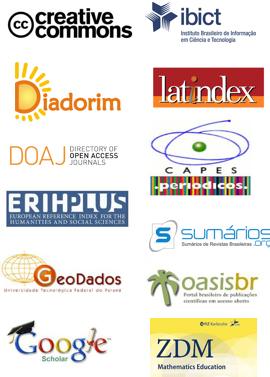Adaptação do Projeto de Aprendizagem Estatístico ao contexto do Ensino Remoto Emergencial
DOI:
https://doi.org/10.17921/2176-5634.2022v15n3p295-303Resumo
Esse artigo traz alguns dos resultados de uma pesquisa de pós-doutorado, realizada no âmbito do desenvolvimento do letramento multimidia estatístico, que buscou caracterizar as estratégias de adaptação adotadas por pesquisadores e professores, envolvidos em um processo de formação continuada colaborativa, frente às adversidades desencadeadas pela pandemia de COVID-19, na implementação do Projeto de Aprendizagem Estatístico (PAE) no modelo do Ensino Remoto Emergencial (ERE), bem como em sua transição para às aulas presenciais. Os sujeitos da pesquisa foram seis professores do Ensino Fundamental, Anos Iniciais e Finais, ministrando diferentes componentes curriculares, em três escolas públicas gaúchas, unidos pelo propósito de aprimorar a sua formação, desenvolvendo projetos de aprendizagem. O material analisado em nossa pesquisa consistiu no registro de reuniões periódicas realizadas por um grupo colaborativo, onde os referidos docentes se apropriavam de teorias, técnicas e metodologias de ensino da Educação Estatística, com o apoio de pesquisadores de uma universidade pública local, nas interações entre os grupos de tutoria por meio de WhatsApp, com esses pesquisadores, professores e seus estudantes e, sobretudo, pelo registro de um grupo focal, realizado ao final desse processo. O marco teórico que amparou essa pesquisa foi a Análise Exploratória de Dados (AED). Ao final, identificamos, nas concepções manifestas pelos professores, avanços cognitivos, com maior domínio docente sobre os aspectos teóricos e metodológicos estatísticos, socioemocionais, com maior confiança e segurança na gestão do PAE, e didático-pedagógicos, com a superação de muitas dificuldades inerentes ao ERE, otimização de tempo e de recursos, bem como maior engajamento dos estudantes.
Palavras-chave: Educação Estatística. Projeto de Aprendizagem Estatístico. Ensino Remoto Emergencial.
Abstract
This article presents some of the results of a post-doctoral research, carried out in the context of the development of statistical multimedia literacy, which sought to characterize the adaptation strategies adopted by researchers and teachers, involved in a process of collaborative continuing education, in the face of adversities triggered by the COVID-19 pandemic, in the implementation of the Statistical Learning Project (PAE) in the Emergency Remote Teaching (ERE) model, as well as in its transition to face-to-face classes. The subjects of the research were six teachers at Elementary School, Initial and Final Years, teaching different curricular components, in three public schools in Rio Grande do Sul, united for the purpose of improving their training, developing learning projects. The material analyzed in our research consisted of the recording of periodic meetings held by a collaborative group, where these professors appropriated theories, techniques and teaching methodologies of Statistical Education, with the support of researchers from a local public university, in the interactions between the tutoring groups through WhatsApp, with these researchers, teachers and their students and, above all, by registering a focus group, carried out at the end of this process. The theoretical framework that supported this research was Exploratory Data Analysis (AED). In the end, we identified, in the conceptions manifested by the teachers, cognitive advances, with greater teaching mastery over the statistical, socio-emotional, theoretical and methodological aspects, with greater confidence and security in the management of the PAE, and didactic-pedagogical, with the overcoming of many inherent difficulties to the ERE, optimization of time and resources, as well as greater student engagement.
Keywords: Statistical Education. Statistical Learning Project. Emergency Remote Teaching.


